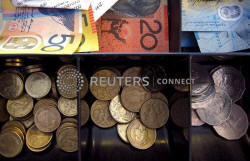|
Appetite for riskier assets was evident across the board. Stocks
and oil rose as progress made on COVID-19 vaccines, which had
underpinned Wall Street overnight, boosted optimism about a
quicker revival for the global economy.
Trump acknowledged the head of the General Services
Administration should go ahead with a transition to a government
led by President-elect Biden, despite plans to continue with
legal challenges.
Democratic allies to the Biden campaign said Yellen is expected
to be nominated to become Treasury Secretary. She has called for
increased government spending to lift the economy out of a
coronavirus-induced recession.
"That should be a positive appointment from the marketís point
of view, as she is expected to pursue conventional policies,"
Commerzbank strategists said in a daily note.
"And as far as the fiscal package is concerned, she is likely to
listen to the Fed's demands and try and push a package as much
as possible."
Yellen has called for more fiscal spending to revive an economy
wrecked by the coronavirus pandemic. She would be the first
person to head the Treasury, the Fed and the White House Council
of Economic Advisers.
In contrast, U.S. Treasury Secretary Steven Mnuchin last week
let some of the Fed's lending programmes expire at the end of
this year, opening a feud with the central bank, which said
those emergency facilities are important to support the economy.
Against a basket of other major currencies, the dollar weakened
0.4% to 92.13, just above Monday's 92.013, the lowest in nearly
three months.
The Australian dollar climbed 0.9% to $0.7367. The euro gained
0.4% at $1.1894.
The euro's gains will be a concern for policymakers at
December's meeting of the European Central Bank. German Ifo data
and PMI surveys showed the European economy is struggling amid
lockdowns to slow a second wave of coronavirus infections.
The dollar also struggled after AstraZeneca said its COVID-19
vaccine could be about 90% effective and it would prepare to
submit data to authorities around the world, increasing demand
for risky assets.
The New Zealand dollar rose as much as 1% to a two-year high of
$0.6985, after the country's government sought advice from the
central bank on how it could help stabilise property prices,
prompting investors to unwind some bets of more easing.
Elsewhere, cryptocurrency Bitcoin scaled a near three-year peak
of $19,000.
(Graphic: Major FX
https://fingfx.thomsonreuters.com/
fx/mkt/xegpbqeynvq/major%20FX.JPG)
(Reporting by Saikat Chatterjee; Additional reporting by
Hideyuki Sano in Tokyo; editing by Kirsten Donovan, Larry King)
[© 2020 Thomson Reuters. All rights
reserved.] Copyright 2020 Reuters. All rights reserved. This material may not be published,
broadcast, rewritten or redistributed.
Thompson Reuters is solely responsible for this content.

|
|





